Roots and Wings as Immigrants: Written as China Blocks the U.S. Secretary of State's Speech
1. Winged seeds
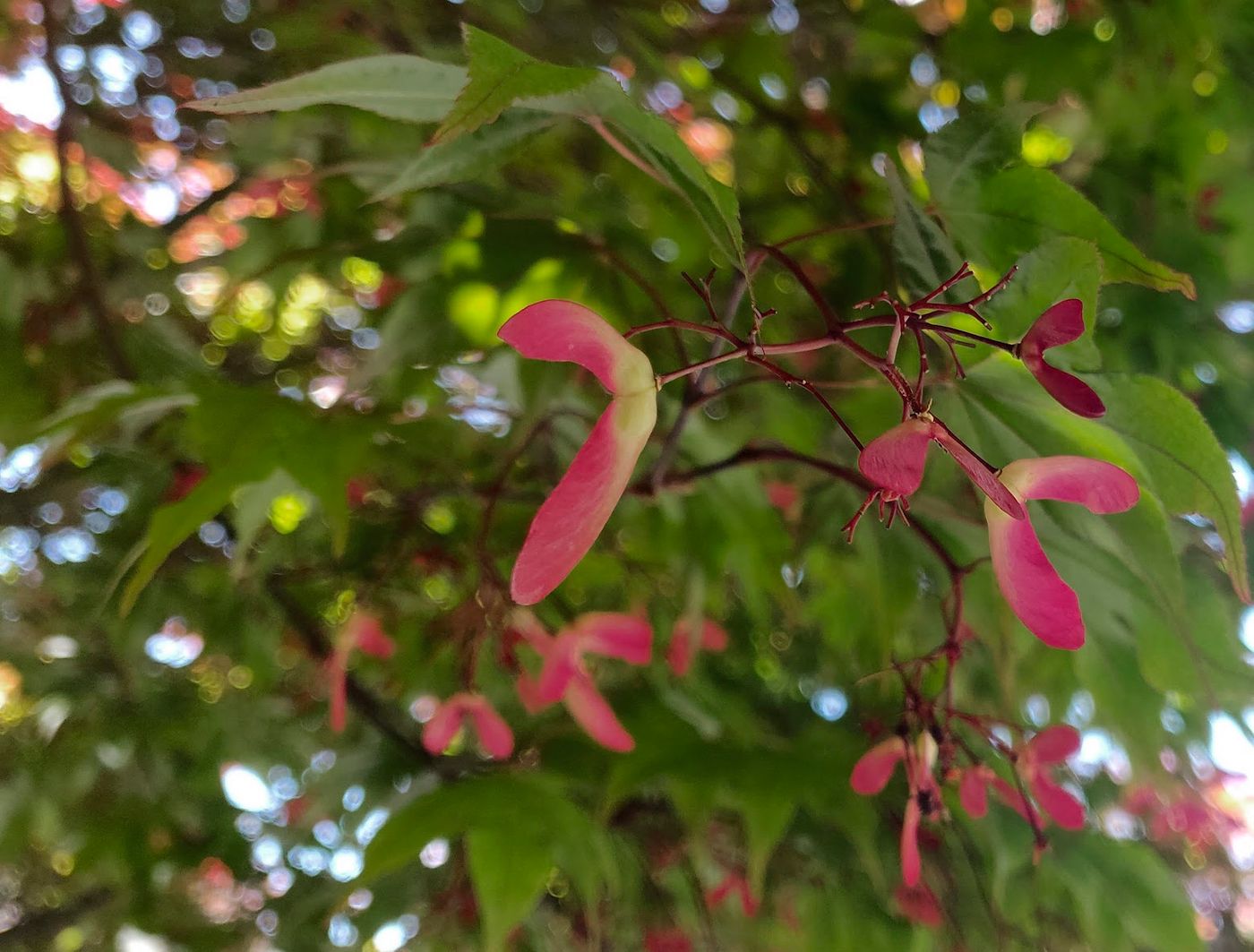
There are many maple trees in front of the house.
It was only the beginning of May, and they had already started to bear seeds with wings, which took a summer to absorb nutrients and grow into full shape. In autumn, the seeds spread their wings and fly, spinning like the propellers of a helicopter, flying all over the sky, and scattering them again. If there is a gust of wind, it can fly very far.
Looking at these beautiful seeds, I can't help but think of what Mr. Chen Guanzhong once said in Matters' online lecture "Living the Contradiction of the Times", that we will always face the contradiction between "root" and "wing". "Root" symbolizes the base that is deeply rooted in the soil and provides people with stable nutrients; "wing" symbolizes the possibility of getting rid of fetters and flying high. ( video , transcript )
I have not been a family lover since I was a child. As an inland middle school student in the 1990s, seeing the take-off of the coastal economy after the reform and opening up, people who left their hometowns have a new outlook and are deeply inspired. There was a popular saying in newspapers and magazines at that time:
Trees move to death, people move to live.
At that time, the social ethos generally praised people who were quick-witted and who looked beyond the framework of the system. Even if the economic reform in the Mainland is delayed, I see hope. I desperately wanted to get out of the shackles of my parents' institutional unit, out of the Sichuan Basin surrounded by mountains, and into some kind of freer existence.
The elders in the family are inevitably conservative, and they also criticized me for being restless and not "filial piety". The household registration management system established on Chinese soil since Qin Shi Huang was deeply ingrained in Chinese minds. Clan, land, place of origin, the trinity, firmly presses people in the system that is most suitable for the centralized management of emperors and queens. Therefore, most Chinese people live like a tree, and they always say that the leaves must return to their roots. We are in an unfree system, not necessarily aware of it. The elders do not understand, and I do not argue. Going farther and farther.
Grandma has always been like everyone's sister, and she loves to give pointers to our children and grandchildren. Grandpa was reticent. Most of the time, he silently reads, writes, and organizes classics in his study. Most of my impressions of my grandfather come from his books on the whole wall: there are a lot of works by Mr. Liang Shuming, one of which was written by him; there are also reflections on the Cultural Revolution, which I borrowed to read, but I was too young to read them. Too understand. Grandpa used to be the principal of a middle school. He was supposed to be a frequent speaker, but I don’t remember how much communication I had with him—probably because he couldn’t chat with me when I was young, and I was a little older and left home. Went to read.
In the winter before leaving for the United States, I stayed with my grandparents in Sanya for a while. One day, I took him for a walk on the park boulevard. The sun tinkled down on us through the broad leaves of the palm trees, and the wind was refreshing. Suddenly he said to me:
Our grandparents are the same. We all broke free from the shackles of family and went our own way.
With my grandfather's words, I seem to have obtained permission to stop obsessing about the discipline of "parents are here, don't travel far".
That was the last time I saw him before he was alive. At that time, he had already suffered from bowel cancer. He climbed mountains, walked, read, and wrote every day, drank some traditional Chinese medicine, and was vegetarian. He did not accept chemotherapy, and faced the last days calmly.
When I first arrived in the United States, I faced various restrictions on visas, vacations, etc., and I was not able to return to him when he passed away. Sitting in the office, thinking of my own involunteering, tears flowed down my cheeks. Said to be free, but after flying so far, he still couldn't make his own decisions.
Grandpa left behind a memoir "Fragments of Boiling Wuzhai". I've been checking it out more and more in recent years. I, who didn't talk much during his lifetime, only found out when I read the story of his life that his DNA has long been re-engraved in my cells, which has become the basis for me to take root in a foreign soil. When he was young, he once wrote:
The concept of hometown is shared by almost everyone, although its views and concepts are different... When you are still in Village A, you will never think that the neighboring Village B is your hometown, but when you go to Village A far away When you are in the county seat, you will think that the villages of Village B are your hometown; when you go further away, you will think that a county is your hometown. Therefore, you may call a province or a country your hometown. If one day, people may leave the earth and go to other planets, should the concept of hometown be expanded to the whole world? This shows how mysterious and empty the scope of "hometown" is, and it can even be said to be boring!
(…)
"Hometown" is originally an abstract noun. When used properly, it is beneficial to society and individuals. When used improperly, it is extremely harmful. This point must be understood clearly, for fellow villagers to be able to have a good source, to hold the right way, and not to be confused by the local concept, it goes against the development of history to the group—the big self—and may even be exploited by others and endanger the society. .
—— "The Hometown View of Miscellaneous" was originally published in the supplement "Xiyuan" of Chengdu "Western Daily" on March 20, 1948
He recorded this juvenile study in his memoirs, and commented on himself in his old age: he opposed the local consciousness of sitting in the well and watched the sky, and the beginning of his intention to defect to the rapids.
I believe he did not blame me for failing to put on a linen and filial piety in front of his sick bed. His ideal was not to be full of children and grandchildren, Cheng Huan's knees. He was born during the Jiang Dynasty and grew up during the civil war between the Kuomintang and the Communist Party. As a young literary man who actively wrote articles criticizing the dictatorship of the Kuomintang, he left his home as a teenager, "betrayed" his ancestors, and joined the Communist Party, under the tutelage of Liang Shuming. After the founding of the People's Republic of China, he sang Lao Mao's hymn, but he was also attacked by criticism. During the Deng Dynasty, I learned to type, surf the Internet, and circumvent the wall. I understand the Internet better than my parents, and I have a little contact with the "foreign forces" on the other side of the Taiwan Strait. After three dynasties, the year of immortality coincides with the fall of Bo Xilai. He died with hope for China's democracy.
Grandpa, you don't even know what happened to the Xi Dynasty in the future. The next history, let me watch it for you.
2. Trees move to death, people move to live
Censorship in China is an interesting social experiment. Originally, ordinary people did not want to follow political leaders to listen to their speeches, but now the censors delete information like a big enemy, which has aroused everyone's interest, searched around for the original text, and scrambled to learn. We have an idiom in Chinese called "There is no silver here, three hundred taels". See China Digital Times [404 Library] for details.
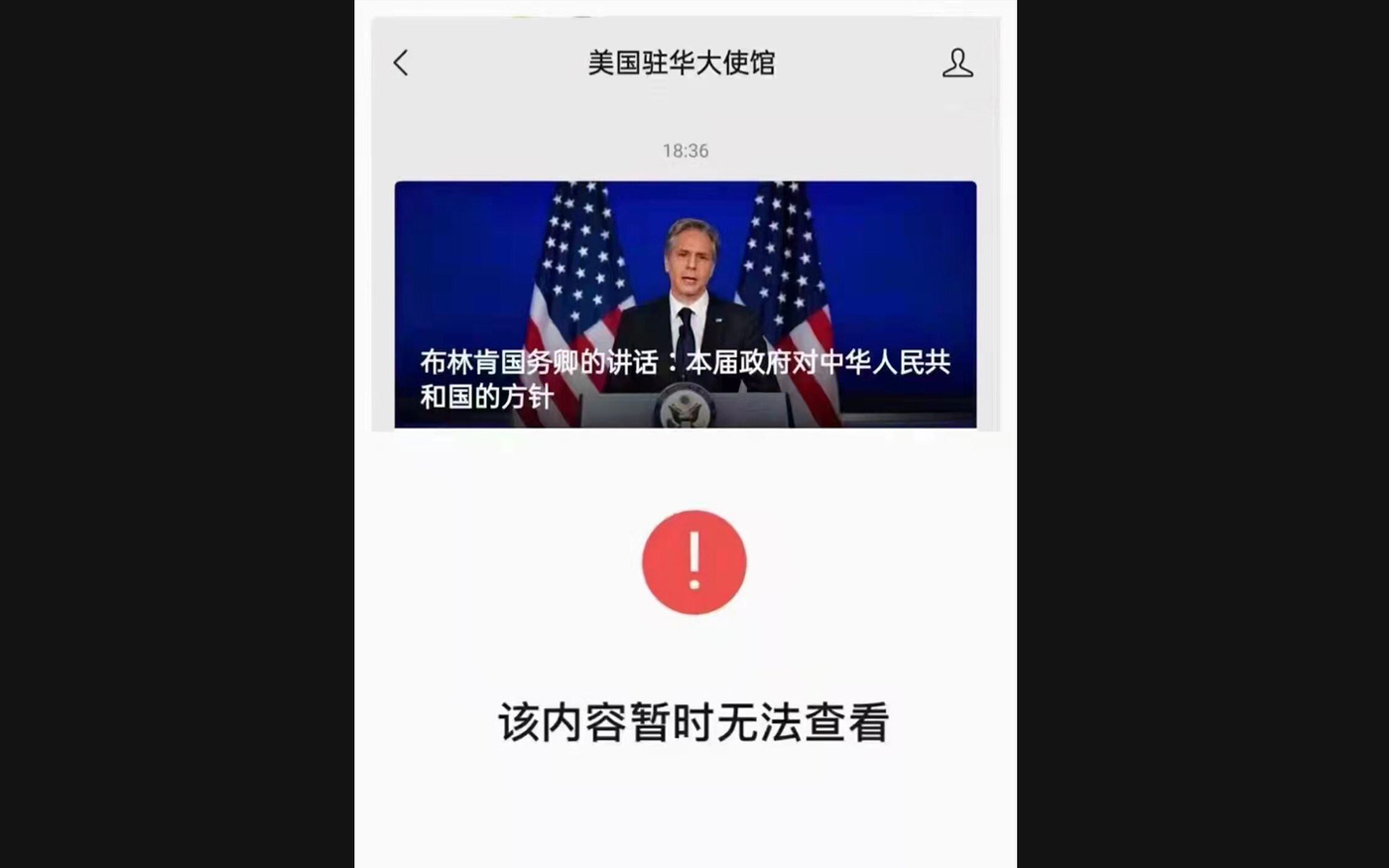
I went to carefully comprehend the recent speech by US Secretary of State Blinken ( official Chinese version ), and read this information:
- The United States recognizes the contributions of all generations of immigrants, welcomes immigrants to build the United States, and does not recognize racial hatred.
- The differences between China and the United States lie between the government and the system, not between the people. Chinese in the United States should rest assured.
- The United States believes in debate, dissent, questioning each other, and confronting its own inadequacy rather than pretending it doesn't exist; the U.S. government believes that these open and democratic modes of discussion are better for the nation.
- However, Beijing sees a centralized system as more efficient, less chaotic, and superior to democracy.
- The United States does not seek to change the Chinese political system, but only creates opportunities to attract talented people, build a prosperous society, enhance human dignity, and let the final results prove the superiority of the democratic system.
- Blinken's words: The future belongs to those who believe in freedom, and all nations will be free to chart their own paths without coercion.
- My own interpretation of the implication: the Chinese government wants to abolish its martial arts, and the United States will not stop it. Those who want to be free choose their own future.
Hmm... A humble immigrant unexpectedly received a love letter from the Secretary of State, and was suddenly a little shy. ?
Of course, Beijing will be furious.
when. Of course. want. Screen. shield. !
Isn't it obvious to wink at the Chinese people and seduce everyone to abandon the dark to the light?
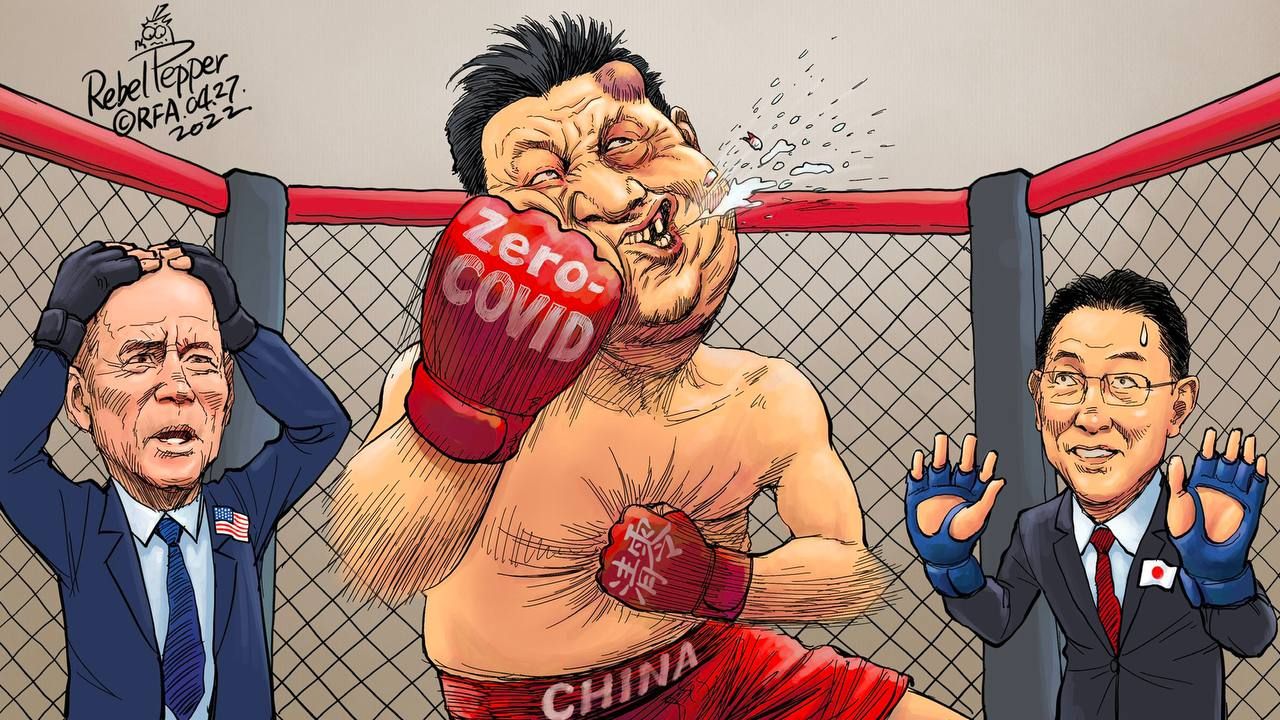
When I left home, I was just a small seed that simply wanted to travel around the world. The melting pot of world cultures just fit my appetite, and it just happened to take root in this land.
And the people who have left China in the last five years are definitely in a different mood from mine. Especially those who are now discussing "enriching learning" feel more or less the feeling of exile. Those who made a fortune in the wave of China's economic boom in the past ten years will now feel the difference will be particularly large. In China, he is obviously the master of eating and drinking. When he came to the United States, he had nothing but money. Who doesn't want to be able to establish their own business on the cultural soil they are familiar with? Designers, lawyers, media, literary writing... These industries are more dependent on cultural regions, and it is not easy to make achievements in unfamiliar cultural environments. Especially if you have established a foundation in China and accumulated professional habits and network resources, you will feel the pain of uprooting when you come out now.
The tree moved to death.
But we should also see what the cost of China's so-called economic boom over the past decade. Riders trapped in the food delivery system, young people who died suddenly after being overwhelmed by 996, Uyghurs detained in Xinjiang labor camps, Han poor peasants who were sent to the Corps to reclaim wasteland and maintain stability, women who were born... Ten years ago, Xi Jinping just came to power , inadvertently said that he liked to play football when he was a child, and Xu Jiayin spent 100 million to buy a football team to please him (although he himself did not watch football at all). Ten years later, Evergrande Group suffered a thunderstorm, and the victims were mainly its own employees . Not only could they not get the investment payment, but they were also forced to come to their door by customers. Do you think it's just a coincidence that the businessman flattered the official, and then the business went bankrupt? There are many intertwined economic origins in Chinese society. If you don't pull it carefully, you may really think that the money is earned by yourself, and as long as you work hard, you will be rewarded. Chinese businessmen can't build a century-old enterprise. There will always be a day when the leeks below will be cut, and the bureaucrats above may come to harvest you at any time. So the best strategy is to run away when you make a fortune, stay anonymous, don't be too public, don't learn from Jack Ma.
So far, China's biggest advantage is that it has the local mentality of "under the knees of the descendants, and the incense will be passed down forever", so it can produce children, has a large population, and has a strong sense of clan. Once the "national rejuvenation" is used to fool around, the whole people will climax. Our beloved Premier Zhou Enlai said during the Sino-Soviet relationship that we, China, are not afraid of a third world war, nor a nuclear war - even if nuclear weapons could wipe out "300 million Chinese", the world would "leave 20 million Americans" people, 5 million British, 50 million Russians and 300 million Chinese".
Live, China had a population of 600 million at that time, and we would still have 300 million left in the event of a nuclear war! Amazing!
What role does our so-called "Chinese descendants" play in the eyes of Chinese rulers? It should be very clear, right?
Many Chinese people, especially Han men who have some relationship with resources, do not understand the relationship between "economic development" and "human rights development". They always feel that China's low human rights status is just an abstract concept. Just make money. As everyone knows, economic development based on human rights violations is unsustainable. In the face of an aging population, young people are generally reluctant to have children, economic slowdown is inevitable, and human rights violations will only happen sooner or later. The "Shanghai experience" is only a precursor.
People move.
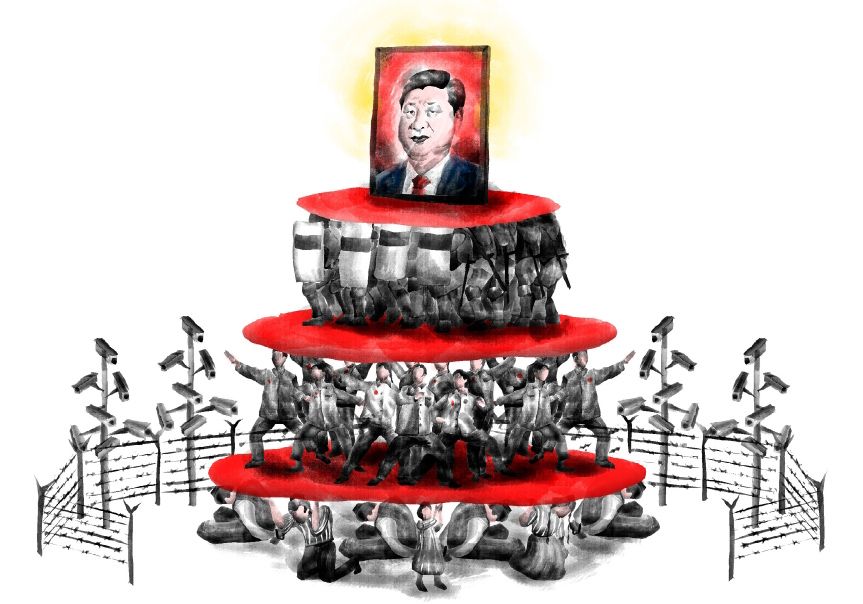
Surviving in a foreign land is indeed difficult. But if you don't leave, you won't be able to see these kinds of strange phenomena.
Only when I went to Jiangsu and Zhejiang did I see how low the proportion of private enterprises in Sichuan was; when I went to Europe, I learned how Tibet was suppressed and how Europeans treated "separatism" (they believed that there was no such thing as "since ancient times". National boundaries, nowhere is an "inseparable part", national boundaries are political and military contests, don't talk about the nation); only when I came to the United States did I know that there are still people in the capitalist country who are seriously studying Marx (not being distorted by Lenin and Mao Zedong). Marx), and published speeches will not be censored.
Originally, I left to activate my thinking, but I also thought about going back to participate in the construction. However, if China has come to this day, if they stay in their "hometown", they will not be able to reflect on the country's mistakes, and they will not be able to join the fanaticism of the crazy pink. In the end, they will become a nihilistic person, and there is only fish left in life. Money, self-preservation, running away, there is no way to build anything.
In the article Get My Language Back , I gave myself a reason to write simplified Chinese, but why did I switch back to traditional Chinese recently? Because it is too difficult to identify with the chaos in China, I feel that it must be cut off. I recently deleted my Douban account, which I had used for fifteen years, and all the comments I wrote about the movies I watched vanished. All WeChat public accounts were closed, and unnecessary WeChat groups were withdrawn, leaving only a few relatives and friends who were temporarily unable to cut their seats.
What to use is the endorsement of why. I'm finally weaning off mentally.
3. Relearn a kind of patriotism
The first two weeks I went to Philadelphia with a friend and visited the Liberty Bell.
In 1751, the backcountry of the United States did not have sufficient smelting technology, so the clock was ordered in London, shipped to Philadelphia, and arrived in 1752. As a result, as soon as the bell tower was installed, it cracked as soon as it was knocked. I want to return it, but the shipping boss can't load it on the ship for some reason. So two nearby smelter craftsmen volunteered to re-forge the bell. After the clock was built and the clock tower was hung up, city officials set up free food and beverage booths, inviting citizens to eat and drink while witnessing the clock forged by the Americans themselves.
Trembling and bumping, hey, it's not broken!
But why does it sound like charcoal pots are fighting each other?
The ridicule of the melon eaters is as ruthless as the autumn wind sweeps the leaves.
So the two craftsmen quickly removed the bell, returned it to the furnace, and tried it again after three months, and finally it was reluctantly accepted by the public.
The bell was originally used only to call the Legislative Council to a meeting. Twenty years later, in the ringing of the bells in Philadelphia, the Declaration of Independence of the United States was released (it is said that it was not the bell that was tolled - but a good bell has thousands of voices, how can it be compared to the first small broken bell developed by us. ?). Subsequent investigation reports revealed that the bell had a series of problems during the first forging, shipping, second and third forging, and was mixed with impure metals, so it was not only unpleasant, but also fragile. In the early days, the people who watched the fun and did not think it was a big deal often came over and knocked down some pieces to take back as souvenirs.
Sixty years later, the Civil War broke out. People who supported the abolition of slavery used this bell as a symbol of the abolition movement and named it the "Liberty Bell" for the first time, just because there was such a sentence on the bell. :
Proclaim LIBERTY Throughout all the Land unto all the Inhabitants Thereof
until all the inhabitants of the lands of each side are declared free
Fast forward another sixty years, and in 1893 President Benjamin Harrison gave a figurative speech with a broken bell, saying:
This old English-made bell needs to be rebuilt on American soil before it can serve as our declaration of independence, self-government, and equality for all.
As soon as the president said this, the meaning of a broken bell was sublimated by countless levels, right?
Of course, there is no shortage of patriotic education and propaganda in front of such historical sites. My friend's American husband walked out after walking around. Americans themselves often have no idea how lucky they are. I read the historical origin of this clock carefully before showing the card, and I actually saw tears in my eyes. Looking up, I found my friend, a Greek immigrant, also reading the leaflet carefully, word by word.
There are many countries in the world that use slaves for forced labor, but the word "slave" has never been explicitly mentioned by any country. The United States is the only country to have slavery written into its constitution. The early U.S. Constitution defined slaves as the private property of slave owners, which could not be plundered and violated. This is a constitutionally protected liberty of the property owner - no person, department, or even state can usurp an individual's private property.

The state cannot forcibly abolish slavery, it can only abolish slavery by amending the constitution. To amend the constitution, you must point to the black and white words on the constitution to refute and debate. Go to court for trial. It was so noisy that a civil war broke out.
Americans enshrined this bell to express such an attitude: freedom is not an overnight event. It doesn't mean being independent means being free. Freedom is a process that requires constant struggle, constant questioning, and constant improvement. The freedom defined a hundred years ago may not be applicable today, and it needs to be upgraded. Later, women fighting for the right to vote, Native Americans fighting for land use rights, and activists active in various affirmative movements today will come to the Liberty Bell with the words "until all inhabitants of all lands are declared free." Resist oppression and seek freedom.
Americans believe that freedom is worth pursuing. This is their value belief. A country with common values and beliefs can fight a civil war, take to the streets, scold each other, and criticize each other, but it cannot shake its foundation.
Walking through the exhibition hall to the big clock, I hugged my friend and took pictures together. Out of the memorial, we sat on the lawn breathing in the fresh air. I was a little surprised by her interest in the clock. I thought it was easy for Europeans to immigrate to the United States, and that they could go back anytime if they were unhappy in the United States. She said that although her country has freedom of speech, it does not have freedom of employment. The entire occupational system in Greece is occupied by a large group of civil servants, which breeds corruption. The whole country does not feel vitality, and young people do not see hope. The country is supported by the squeeze of immigrants—her uncle’s family came to Greece from next door Bulgaria decades ago, and worked hard all their lives. In the end, because they were “temporary residents”, they could not even get insurance money. Only then did I understand why she helped her cousin so much, pulling and pulling for her to study, find a job, and buy a house in the United States. She looked at me with a sigh of relief and said, "We made it."
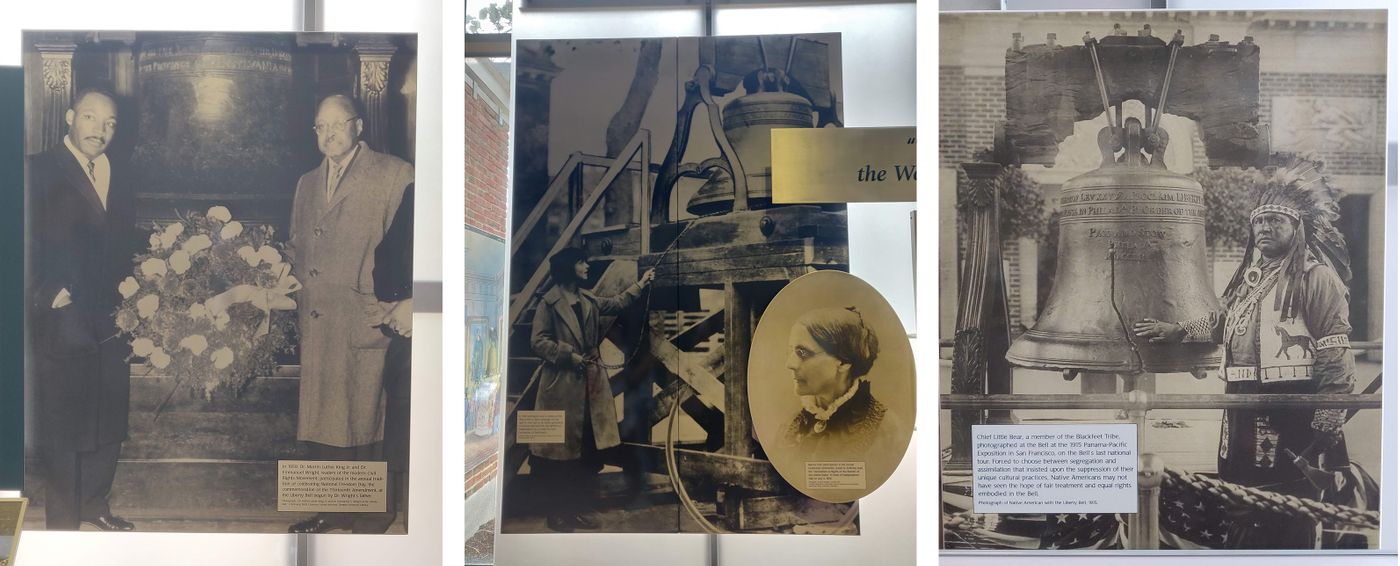
America has had a very bloody history and still has many problems to this day. I don't need to sing its praises - I'm sure I'll be writing about America's ills soon. But the advantage of the United States is precisely that all those who sacrificed in the pursuit of freedom have been left in the historical record of this country for future generations to comment on. It is only by reviewing and reflecting on these histories over and over again that the process of this country's history has been advanced. On the other hand, China, for thousands of years, has been best at burning books and beating Confucians, succeeding kings and defeating pirates, engaging in literary prisons, and tampering with history. All those who have fought for freedom have been destroyed, forgotten, and never reflected, so history keeps repeating and stagnant.
Without ideals and beliefs in China, society is actually a mess. In the past 30 years, it has been money making to bring Chinese people together. Once economic growth slows down, social contradictions will become prominent. As mentioned earlier, the economic model with cutting leeks as the main GDP growth is doomed to be unsustainable. The CCP has argued that it is legitimate. The only reason for sex is the so-called "national rejuvenation". For the sake of "national rejuvenation", it is not a problem to sacrifice "300 million".
The problem is that the concept of "nation" will gradually disappear. Just as the concept of "hometown" written by my grandfather did not stand up to scrutiny, the concept of "nation" also did not stand up to scrutiny. China, as well as Europe, all these ancient lands with some historical origins are burdened with the heavy shackles of "nation", and it is difficult to move forward lightly.
The so-called nation, in ancient times, was based on blood, language, customs, etc., and it was indeed the foundation for the maintenance of clans and tribes. In Sichuan, Chengdu and Chongqing people always have to compete. After leaving the province and crossing the country, they all become the blood of Bashu. The concept of nation, like "hometown", can easily be used to divide the enemy and ourselves. For the reasonable existence of the "country", the CCP discredits some ethnic groups and praises others.@Lola's Frontiers, Nations and Religions series vividly describes how the "nation" uses the "nation" to achieve itself.
Nation used to be a useful excuse, following the concept of clan and tribe, a person fought for his tribe to the point of sacrifice, and the whole tribe would be grateful and pay homage. But when the tribe developed into a multi-tribal state, "sacrifice for the nation" was already far-fetched. Not to mention that in the post-globalization world, ethnic integration and intercommunication is a major trend. At this time, the regimes that still rely on the "ethnic" to rationalize the "country" are all countries that lack consensus on "values" and will sooner or later be eliminated by history. .
4. Roots and Wings
Trees have roots that bear winged seeds. Seeds fly away and grow into new trees. Roots and wings may not be contradictory at first.
A seed has a record of growth conditions in its DNA, and it can adapt to a new environment in unfamiliar soil. And people can leave a written record, go back and reflect on their past knowledge, and say, "Oh, I used to think that it was like that, but now I realize that I was wrong. Why did I think that way in the first place?"
Roots are things that are recorded. Wing, is going to revise its power.
My grandfather named his study Feiwuzhai, which means "waste". He said that he liked to collect newspapers and books since he was a child, but he had no choice but to destroy it once during the Land Reform and once again during the Cultural Revolution. Fortunately, the last few decades were safe and sound, and the books and newspapers at home gradually piled up like a mountain. He laughed and said that there were outdated people sitting in his study, with outdated views, but they were just precious and unwilling to scrap them, hence the name Boiwuzhai.
again,
Of course, the choice of the word "boiling" is not entirely easy. Boiling is the boiling of blood. Back then, the blood was boiling, but now the heart is not cold. Wu is towering and upright. Although the bald mountain is lonely, it can calmly face the vicissitudes of life without swaying with the wind. The combination of cold and heat is a scientific attitude. It is used to look at things less biased, and to look at people, in order to be tolerant and generous. Believing in democracy and freedom will never be out of date. If you have already done it, you are willing to encourage yourself.
Like my work? Don't forget to support and clap, let me know that you are with me on the road of creation. Keep this enthusiasm together!





















